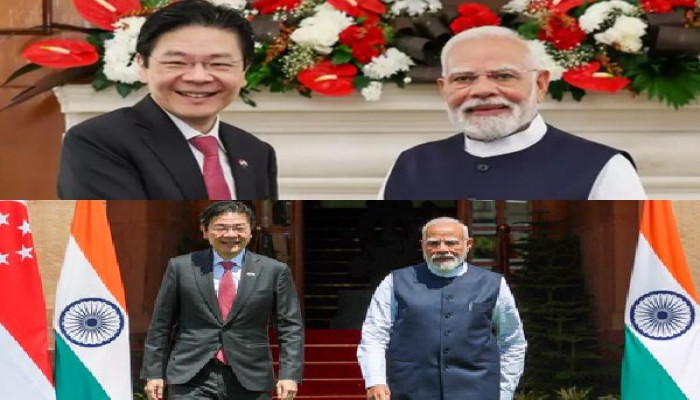India, Singapore release roadmap to deepen strategic partnership amid global turbulence
- In Reports
- 07:58 PM, Sep 04, 2025
- Myind Staff
India and Singapore on Thursday released a new roadmap to strengthen their comprehensive strategic partnership, with Prime Minister Narendra Modi and his Singaporean counterpart Lawrence Wong underlining the need to deepen ties to navigate the geopolitical turbulence of the present times.
Wong, who arrived in New Delhi on Tuesday, met Modi for wide-ranging talks that spanned the entire scope of bilateral relations.
“India-Singapore relations go far beyond diplomacy,” Modi said while speaking to the media in Wong’s presence. He added that both sides had decided to expand cooperation in artificial intelligence, quantum and other digital technologies.
“We share common concerns regarding terrorism,” Modi stated. “We believe that fighting against terrorism with unity is the duty of all countries which believe in humanity,” he continued.
The Prime Minister stressed that the partnership between the two countries is rooted in shared values and is guided by mutual interests and a common vision for peace and prosperity.
Echoing this, Wong said that in a world marked by uncertainty and turbulence, the India-Singapore relationship becomes even more significant.
Following the talks, several agreements were signed, including an agreement on digital asset innovation between the Reserve Bank of India and the Monetary Authority of Singapore.
Wong said that the partnership between India and Singapore has become even more important in a world marked by uncertainty and turbulence.
Speaking about the scope of bilateral ties, Modi said, "The partnership with Singapore has expanded beyond traditional sectors to cover advanced manufacturing, green shipping, skilling, civil nuclear cooperation, and urban water management."
Modi added that several Indian states are becoming active partners in these ties, pointing to the recent visits of the chief ministers of Odisha, Telangana, Assam, and Andhra Pradesh to Singapore, while Gujarat’s GIFT City has emerged as a new bridge linking the stock markets of both nations.
Modi noted that the semiconductor partnership signed last year has given new momentum to research and development, with Singaporean companies joining India’s Semicon conference.
According to a government release, Singapore will also help establish a National Centre of Excellence for Skilling in Chennai to train workers in advanced manufacturing. Modi said the two countries will expand cooperation in artificial intelligence, quantum, and other digital technologies, and that the next round of the India-Singapore Hackathon will be held later this year.
Emphasising the wide-ranging collaboration, Modi highlighted the success of the unified payments interface (UPI) PayNow link, which has now added 13 more Indian banks. He said the new agreement on Green and Digital Shipping Corridors would improve green fuel supply chains and port clearances. Modi also inaugurated phase 2 of the Bharat Mumbai Container Terminal, built by Singapore’s PSA International, which will expand India’s container handling capacity.
Singapore, Modi said, continues to be a key pillar of India’s Act East Policy and a partner in strengthening ASEAN and stability in the Indo-Pacific. He also expressed gratitude to Wong for showing solidarity with India after the recent terror attack in Pahalgam and for Singapore’s support in the fight against terrorism.
The renewed effort to strengthen trade with Singapore is being seen as part of India’s broader strategy to reduce risks from Washington’s tariff escalation. Trade experts said that stronger economic integration with South East Asia could offer Indian exporters alternative markets at a time when the US and China are hardening their trade positions.
"With Trump’s tariff moves disrupting global supply chains, India is looking to regional partnerships as a shield against uncertainty and a way to draw in capital and technology," said Abhash Kumar, trade economist at Delhi University.
Data from the commerce ministry shows that India’s exports to Singapore in fiscal year 2025 were at $ 12.98 billion, while imports stood at $ 21.29 billion, leading to a trade deficit of $ 8.31 billion. In fiscal year 2024, exports were higher at $ 14.41 billion, while imports were $ 21.20 billion, resulting in a deficit of $ 6.79 billion.
India’s main exports to Singapore include petroleum products, chemicals, ships and floating structures, as well as electrical machinery, precious metals, and electronic instruments. Imports from Singapore include electronic components, computer hardware, coal and briquettes, plastic, organic chemicals, and other items.
"This trade pattern shows Singapore’s role as a hub for technology, energy, and shipping, and as a re-export centre linking India to global supply chains," said Kumar.
According to a statement from the Singapore Embassy, the two prime ministers discussed expanding cooperation in sustainability, digitalisation, connectivity, skills development, advanced manufacturing, semiconductors, space, and biotechnology.
Wong also urged greater collaboration on cross-border data flows and capital markets, the statement said.







Comments